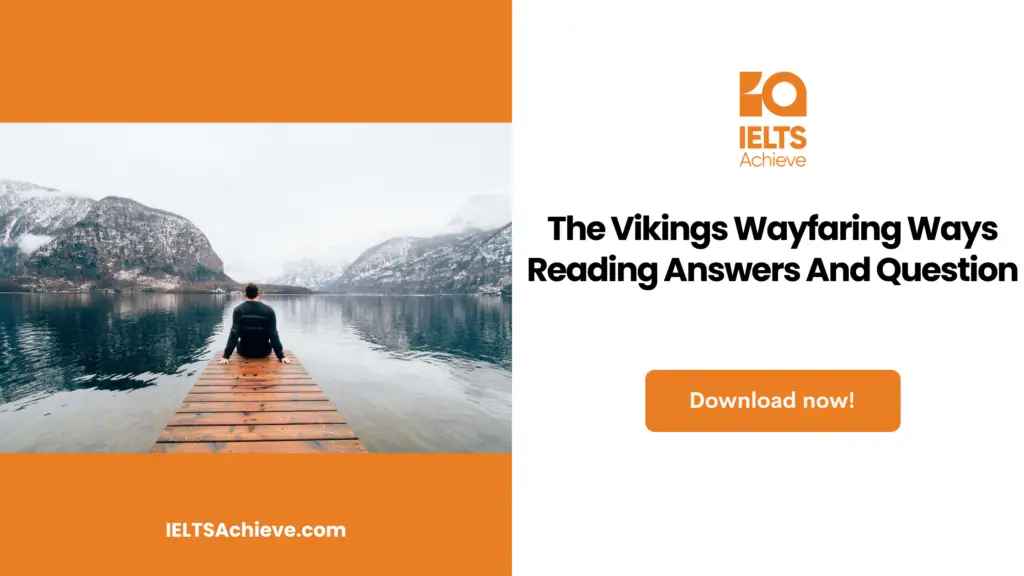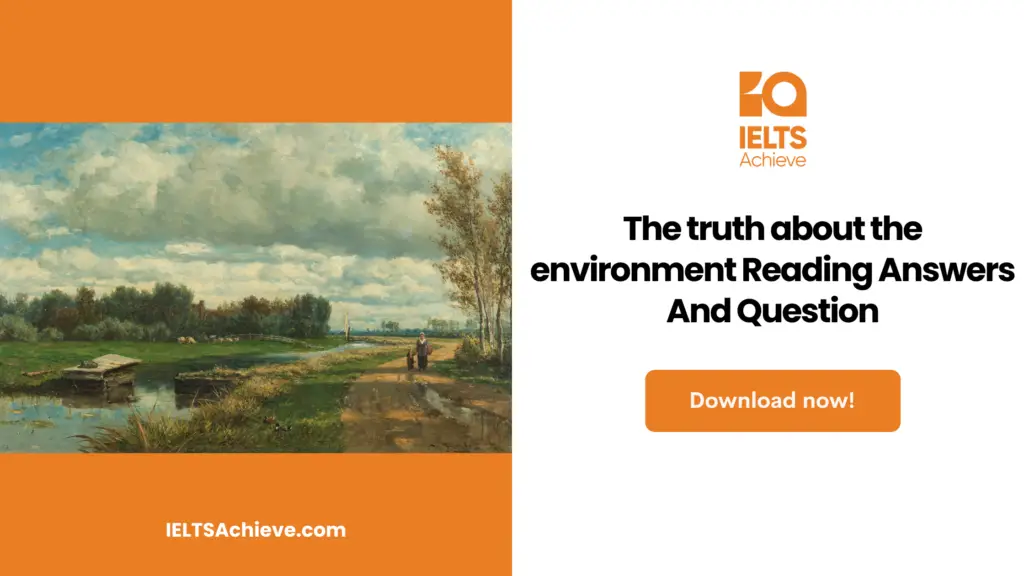The Blog post contains the following IELTS Reading Questions:
- IELTS Reading Multiple CHoice Questions
- IELTS Reading Matching Features
- IELTS Reading Notes Completion
Stay informed and prepared for success – Explore our comprehensive Reading Test Info page to get valuable insights, exam format details, and expert tips for mastering the IELTS Reading section.
IELTS Reading Passage – The Vikings Wayfaring Ways

The Vikings wayfaring ways
There have been many shifting interpretations of Vikings over the past century. It’s intriguing to learn how Vikings have been used to establish nations.
Vikings are also referred to as Norse or Norsemen in the English language. Words like “blunder,” “snub,” “take,” and “want,” as well as the nouns “Hell,” “husband,” and “law” and “window,” all have their roots in Old Norse and have had a major impact on the formation of the English language. The word “Viking” has several possible meanings, including “a Scandinavian pirate,” “obscure,” or a reference to a place called Vik in modern-day Norway, where the pirates originated. Different groups have been referred to as Vikings, Norse, or Norsemen throughout history, and some scholars even question the use of the term “Viking” itself.
The Viking Age lasted roughly from the late eighth to the mid-eleventh century. In AD 793, Vikings sailed to England to plunder coastal monasteries; after their success, they ruled over large swaths of the country, and several of their kings even ascended to the English throne. It is generally agreed that the Norman French invasion of 1066, at the Battle of Hastings, marked the end of the English Viking Age. However, the Viking Age ended earlier in Ireland, and the Viking colonies in Iceland and Greenland did not disband until the early sixteenth century.
The extent to which the Vikings extended beyond Scandinavia and Western Europe is also a matter of some debate. Archaeological evidence has yet to confirm that Vikings raided as far as Northwest Africa, as some writers claim, but they did plunder and settle down the Volga and Dnieper rivers and trade with modern-day Istanbul.
As many Vikings did not return to Scandinavia after raiding, but instead assimilated into local populations, many of whom became Christians, the issue of control and extent is complicated. Religion defined the Viking Age to some extent. Vikings were polytheists at first, worshipping multiple gods, but by the end of the age, they had permanently accepted a new monotheistic religious system – Christianity.
There has been a widespread narrative throughout the last few centuries that emphasises the significance of a change in leadership from uncivilised pagans to more enlightened Christians. As an example, in the 1970s, United Kingdom schoolchildren were taught that the Vikings were bad, barbaric heathens who had ravaged Britain before they converted to Christianity. Today’s youth, on the other hand, have the opportunity to visit museums that honour the Vikings not just as conquerors but also as merchants, pastoralists, artists, and proponents of a distinctive worldview.
To what extent do other definitions of Vikings exist? Historians in Denmark, Norway, and Sweden, all in the nineteenth century, created their own Viking ages for nationalistic reasons. Each of those three nations was experiencing a crisis at the time. Following a crushing military defeat, Denmark had to surrender territory in what is now Germany. As Norway’s economy struggled after its 1905 independence from Sweden, its citizens looked to the past and present to forge a unique national identity. The Norwegian historian Gustav Storm was adamant that his ancestors, not the Swedes or the Danes, had colonised Iceland, Greenland, and Vinland, the area that is now Canada. In the meantime, Sweden had lost Norway to the Norwegians and Finland to the Russians, so the country was eager in the late nineteenth century to improve its reputation by showcasing the splendour of its Viking past through priceless archaeological finds.
An Englishman, Herbert Spencer, who described people and cultures in evolutionary terms similar to those of Charles Darwin, had an impact on nineteenth-century thinkers and helped to bolster nationalism. Spencer popularised the term “survival of the fittest,” which incorporates the idea that humanity makes moral and technological advancements over time. Therefore, the conversion of the Viking heathens to Christianity was seen as a positive development. The archaeological record seems to show that heathen Vikings and Christian Europeans were equally brutal, so modern historians do not compare cultures in the same way.
Not only do historians’ perspectives on the Vikings shift based on the circumstances of their research, but also on the sources they consult. Some Danish historians dismiss these works as “mere legends” because they were written up to 300 years after the events they describe.
Most of what is known about the Vikings from the modern era comes from writers of other cultures, such as the ninth-century Persian geographer Ibn Khordadbeh. The Vikings had a written language carved on large stones, but few of these survive today.
The impact of the Vikings on Russia has been widely interpreted in the last 40 years. Many historians who are not native Russians believe that a Viking king named Rurik established a kingdom in what is now western Russia and the Ukraine. After 862, Rurik’s offspring maintained their dynastic position. There is abundant proof of this colonisation, including surviving runic inscriptions in Sweden that detail the conquests, loan words from Old Norse in Russian and Ukrainian, and the continued use of Scandinavian first names like Igor and Olga. During the Soviet era, however, the widespread Slavic ancestry of the Russian people was celebrated. (The Slavs first appear in historical records around the sixth century AD and are generally believed to have originated in Eastern Europe.) During the Cold War, efforts were made to promote this Slavic identity in order to differentiate it from that of their Nordic neighbours, the Swedes.
Many contemporary Russians see themselves as hybrids, and this perception is widespread. Recent genetic studies lend credence to the idea of a Norse colonisation of Russia; western Russian DNA is found to be consistent with that of people living in an area of Sweden north of Stockholm.
Modern historians have access to a wide range of resources, making their findings appear less contested. Along with deciphering runes and building formidable ships, we now have linguistics, numismatics, dendrochronology, archaeozoology, palaeobotany, ice crystallography, climate analysis, and DNA analysis at our disposal. Historians, despite these advances, are still products of their time.
Unlock your full potential in the IELTS Reading section – Visit our IELTS Reading Practice Question Answer page now!
Recommended Questions:
Renewable Energy IELTS Reading Question with Answer
The Vikings Wayfaring Ways Reading Questions
Questions 1- 8
Look at the following statements and the list of times and places below. Match each statement with the correct place or time: A-H. Write the correct letter, A-H, in boxes 1-8 on your answer sheet.
- Viking history is more related to legends than facts according to the declaration made by the historians.
- Locals are nearly related to the Swedes according to the DNA tests.
- People consider themselves to be unconnected to vikings.
- The happening of viking culture was documented by a geographer.
- After a territorial loss, viking conquests are overstated to boost mentioned pride.
- A historian believes his nation supplied the original viking settlers of what is now Canada.
- Viking culture and economic activities are learnt by young individuals.
- Cultures are categorised hierarchically by a philosopher.
List of times & places
A. In 19th century England
B. In Russia today
C. In Denmark today
D. In 9th century Persia
E. In 19th century Norway
F. In mid 20th century Soviet Union
G. In the UK today
H. In the 19th century Sweden
Improve your performance in Matching Features questions by clicking here to access our comprehensive guide. Learn how to match specific features or characteristics with the options provided in the IELTS Reading section.
Question 9
Which one of these titles could be perfect for this section?
A-E, please select the proper option.
If the answer is found in box 9, please write it down.
A condensed account of Viking history
B Recent Viking Finds
C The modern craze for Vikings
D Different Views on the Vikings
E History and Viking nationalism
Ready to improve your performance in Multiple Choice Questions (MCQs)? Click here to access our comprehensive guide on how to tackle MCQs effectively in the IELTS Reading section.
Questions 10-14
Complete the notes below. Write NO MORE THAN TWO WORDS OR A NUMBER for each answer. Write your answers in boxes 10-14 on your answer sheet.
Origins: The word “viking” is a ________
10. Vikings came from Scandinavia_________
Dates of the Viking Age: AD 11. ______________
-1066 in Britain
- Length varies elsewhere
- In doubt- but most of Europe
Territorial extent: Possibility of a far-ranging raid, possibly reaching
12. ___________End of the Viking Age: The Vikings have fully embraced the 13. _______________, and the 14. _________________ system.
Boost your performance in Summary, Notes, Table, and Flowchart Completion tasks. Click here to explore our detailed guide and learn how to effectively complete summaries, notes, tables, and flowcharts in the IELTS Reading section.
Unlock your full potential in the IELTS Reading section – Visit our IELTS Reading Practice Question Answer page now!
Recommended Questions:
Renewable Energy IELTS Reading Question with Answer
The Vikings Wayfaring Ways Reading Answers
1. In Denmark today
2. In Russia today
3. In mid-20th century Soviet Union
4. In 9th-century Persia
5. In 19th-century Sweden
6. In 19th-century Norway
7. In the UK today
8. In 19th-century England
9. D
10. Obscure
11. 793
12. Northwest Africa
13. Local populations
14. Religious

We hope you found this post useful in helping you to study for the IELTS Test. If you have any questions please let us know in the comments below or on the Facebook page.
The best way to keep up to date with posts like this is to like us on Facebook, then follow us on Instagram and Pinterest. If you need help preparing for the IELTS Test, join the IELTS Achieve Academy and see how we can assist you to achieve your desired band score. We offer an essay correction service, mock exams and online courses.

